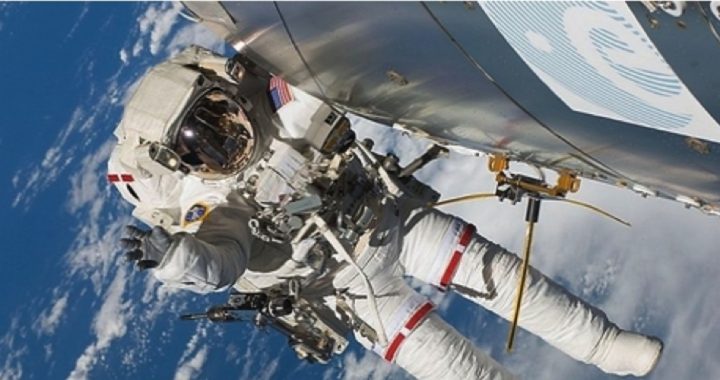
In response to sanctions announced by President Barack Obama in March against Russian Premier Vladimir Putin and some of his associates, and an escalation of those sanctions announced by the president in July, Russian Deputy Minister Dmitry Rogozin threatened to cut off all supplies of its RD–180 rocket engines to the United States. The engines are critical to the continued operation of the Evolved Expendable Launch Vehicle (EELV) program, the fourth-largest line item in the U.S. defense budget.
A spokesman for the U.S. Air Force, Major Eric D. Badger, told the Washington Times that the service is now “evaluating options to end the use of Russian engines … [while] looking at longer-term options to develop additional US-built high-performance engines.”
It is noteworthy that though even a group of schoolchildren probably could have forecast the consequences of making Russia our supplier of these critical rocket engines, all the wisdom of the U.S. government missed it. One of those aware of the decision to deal exclusively with Russia for the U.S. supply of engines was Michael Hayden during his stint as director of the National Security Agency from 1999 to 2005. It was during this period that international agreements to support the International Space Station (ISS) were completed between Russia, Japan, and the European Union.
Hayden, now retired, tried to distance himself from that decision when he rhetorically asked the Times: “What were we thinking? It’s clear now that relying on Russia for rocket engines was a policy based on hope, not good judgment.”
Hayden is at least accurate in one area: The story of how the United States came to be dependent upon Russia as its only supplier of these engines is one of hope over experience, where desire to foster friendly relations with the former Soviet Union after its apparent collapse in 1989 overrode common sense.
Michael Waller, a political warfare professor at the Institute of World Politics in Washington, D.C., noted cryptically: “Relying on Russian rocket engines to launch American spy satellites may have not been a problem when the US and Russia were working together to build the International Space Station, but it is definitely a problem now. The fact that we are dependent on the Russians for rocket engines gives Vladimir Putin a chokehold over the United States.”
It was back in March when President Obama blacklisted a bank and several wealthy businessmen with close ties to Putin in response to Russia’s incursions into the Ukraine. At the time he also opened the door to more sweeping measures against parts of the Russian economy, including the oil and natural gas industries. Obama said at the time, ”Russia must know that further escalation will only isolate it further from the international community.” A spokesman for Putin said that there would be a “reciprocal response” to those sanctions.
On July 17, Obama upped the ante by expanding sanctions against two banks, two energy companies, and several Russian defense contractors. The president had great expectations that the sanctions would work: ”What we are expecting is that the Russian leadership will see once again that its actions in the Ukraine have consequences, including a weakening economy and increasing diplomatic isolation.” The very next day Putin pushed back, saying “[Obama’s sanctions will] generally have a boomerang effect and, without a doubt, in this case, are driving the Russian–US relations into a stalemate and seriously damaging them. I am certain that this is harmful to the US administration and the American people’s long-term strategic national interests.”
To make his point, Putin put on hold Moscow’s renewal of its partnership with the International Space Station. This outraged Susan Eisenhower, president of the Eisenhower Group consulting firm: “Rolling back space cooperation could be counterproductive and damaging to our national security and our long-term space agenda. During the Cold War, scientific and technical communities played a vital role in serving as a bridge between the United States and the Soviet Union, especially during times of crisis.”
Were the Founders still alive, they would no doubt be exclaiming: “We told you so!” In his farewell address, President George Washington said:
It is our true policy to steer clear of permanent alliance with any portion of the foreign world.…
The great rule of conduct for us, in regard to foreign nations, is in extending our commercial relations, to have with them as little political connection as possible.
In his inaugural address in 1801, President Thomas Jefferson said that one of the “essential principles of our government” is that of “peace, commerce and honest friendship with all nations, and entangling alliances with none.” In 1823, President James Monroe kept the faith: “In the wars of the European powers, in matters relating to themselves, we have never taken part, nor does it comport with our policy to do so.”
In 1863, Secretary of State William Seward defended America’s “policy of non-intervention: straight, absolute, and peculiar as it may seem to other nations,” adding that the national government should “forbear … at all times, and in every way, from foreign alliances, intervention, and interference.”
While threatening to shut off America’s supply of rocket engines to support the International Space Station and the EELV program may seem a small thing at the moment, it is indicative of the potential threat that suppliers of critical U.S. military supplies by enemies such as Putin can now employ because of those entangling alliances. In an increasingly dangerous world, Professor Waller is right: Those entangling alliances are now serving as a chokehold on America’s essential interests.
A graduate of Cornell University and a former investment advisor, Bob is a regular contributor to The New American magazine and blogs frequently at www.LightFromTheRight.com, primarily on economics and politics. He can be reached at [email protected].



